Let’s begin by saying, “Don’t put all your eggs in one basket.”
Understanding the distinction between polyamory and ethical non-monogamy is crucial in today's diverse relationship landscape. As we explore the intricacies of these two concepts, we'll shed light on the nuances that set them apart.
It's like peeling back the layers of a complex social dynamic to reveal the core differences that shape our understanding of modern relationships.
Join us on this journey of unraveling the complexities of polyamory and ethical non-monogamy to uncover the key differentiators that define these relationship structures.
Key Takeaways
- Polygamy involves multiple marriages, while ethical non-monogamy focuses on consensual connections.
- Ethical non-monogamy emphasizes honesty and communication, unlike traditional polygamous structures.
- Polygamy is often tied to religious or legal obligations, while ethical non-monogamy values mutual respect and consent.
- Ethical non-monogamy allows for diverse relationship styles with a focus on transparency and respectful connections.
Defining Polyamory and Ethical Non-Monogamy
Polyamory and Ethical Non-Monogamy are relationship models that prioritize emotional connections and open communication over traditional notions of exclusive romantic partnerships. In these relationship styles, individuals can form deep emotional bonds with multiple partners, fostering intimate and supportive connections beyond the constraints of monogamy. Within polyamory, people engage in romantic relationships with several partners simultaneously, emphasizing emotional intimacy alongside physical expressions of love. This approach allows individuals to explore different facets of themselves and build varied connections based on mutual respect and consent.
Ethical non-monogamy, a broader category encompassing polyamory, extends the principles of honesty, communication, and respect to various relationship structures beyond romantic entanglements. It emphasizes the importance of transparent communication and mutual agreement among all involved parties, ensuring that everyone's needs and boundaries are acknowledged and upheld. By prioritizing emotional connections and ethical behavior, both polyamory and ethical non-monogamy offer people the freedom to navigate relationships in ways that align with their values and desires.
Principles of Polyamory Vs. Ethical Non-Monogamy
In exploring the principles of ethical non-monogamy compared to polyamory, we delve into the distinctions that guide diverse consensual relationship dynamics.
- Emphasis on Communication: Ethical non-monogamy prioritizes open communication and honesty in all relationships, ensuring that all parties involved are aware and consent to the relationship structure.
- Transparency and Honesty: Both polyamory and ethical non-monogamy value transparency and honesty, but ethical non-monogamy extends these principles to all forms of non-monogamous arrangements, not just romantic relationships.
- Consent and Respect: Ethical non-monogamy places a strong emphasis on consent and respect in all relationship dynamics, promoting a culture of understanding and mutual agreement among partners.
Understanding these fundamental principles can help individuals navigate the complexities of loving relationships with multiple partners in a consensual and respectful manner.
Practices in Polyamory and Ethical Non-Monogamy
Engaging in multiple relationships while prioritizing honesty and respect is a key aspect of both polyamory and ethical non-monogamy.
In polyamory, individuals form deep emotional connections with multiple partners, fostering a sense of love and intimacy that goes beyond traditional monogamous relationships. This practice involves open communication, where boundaries are discussed and consent is paramount in all relationship dynamics.
On the other hand, ethical non-monogamy provides a framework for exploring diverse relationship structures while upholding ethical standards. It allows individuals to engage in various forms of relationships, ensuring that all parties involved are aware and consenting to the relationship dynamics.
Both polyamory and ethical non-monogamy emphasize the importance of mutual respect, communication, and establishing clear boundaries to ensure that all partners feel valued and heard within the relationship. By prioritizing these practices, individuals can navigate the complexities of multiple relationships with understanding and empathy.
Overlapping Aspects of Poly and Ethical Non-Monogamy

Through the lens of both polyamory and ethical non-monogamy, the shared values of consent, communication, and mutual respect serve as foundational pillars in navigating multiple relationships with care and understanding. In these relationship structures, it's vital to prioritize honesty, trust, and respect among all partners involved. This common ground helps create a solid foundation for building connections that are meaningful and sustainable.
- Consent: Whether in polyamorous arrangements or ethical non-monogamous partnerships, consent is paramount. It ensures that all individuals involved willingly and enthusiastically participate in the relationship dynamics.
- Communication: Open and honest communication is key to maintaining healthy connections in both polyamory and ethical non-monogamy. It allows for the sharing of feelings, needs, and boundaries, fostering understanding and trust among partners.
- Trust: Establishing and nurturing trust is essential in navigating the complexities of multiple relationships. Trust forms the basis for mutual understanding and respect, creating a safe and secure environment for all individuals involved.
Navigating Complex Dynamics: Key Differences
How do the intricate dynamics of polygamy and ethical non-monogamy differ in terms of relationship structures and values?
Polygamy involves marrying multiple partners, often within religious or legal frameworks, while ethical non-monogamy, such as polyamory, prioritizes consensual and honest connections.
In polygamy, one individual typically weds multiple partners, whereas polyamory allows for loving relationships with multiple people simultaneously.
Ethical non-monogamy encompasses various relationship styles like open relationships, polyfidelity, and polyamory, each with distinct dynamics and boundaries.
Communication and mutual respect are central in ethical non-monogamous relationships, contrasting with the traditional and often restricted nature of polygamous unions.
Understanding these differences is crucial for navigating the complexities of managing multiple romantic connections and establishing healthy relationship dynamics.
Frequently Asked Questions
What Is the Difference Between Poly and Ethical Non-Monogamy?
We understand the curiosity about the distinction between poly and ethical non-monogamy. Polyamory involves loving multiple people romantically, while ethical non-monogamy encompasses consensual non-monogamous relationships with open communication. Both prioritize consent, communication, and respect.
Essential elements include clear boundaries, negotiation, and ongoing communication. These relationships thrive on emotional connections and various structures beyond polyamory. It's crucial to navigate these dynamics with care and understanding for all involved.
What Is the Difference Between Poly and Monogamous?
When it comes to the difference between polyamory and monogamy, the key contrast lies in the number of romantic partners involved.
Polyamory embraces multiple relationships, allowing for emotional connections with more than one person, while monogamy focuses on an exclusive partnership with a single individual.
It's all about the approach to romantic connections—embracing multiple partners in polyamory versus prioritizing exclusivity with one partner in monogamy.
Why Is Polyamory Ok but Not Polygamy?
Polyamory is considered acceptable while polygamy faces more scrutiny due to the historical power imbalances and unequal treatment of partners. Polyamory emphasizes consensual and transparent relationships, promoting equality among all involved.
In contrast, traditional polygamy often perpetuates gender inequalities and hierarchical structures. Modern society values ethical and equitable relationship practices, leading to greater acceptance of polyamory over polygamy. This shift reflects evolving attitudes towards healthy and respectful partnerships.
What Is the Difference Between Poly and Polygamy?
We can shed light on the difference between poly and polygamy. Polyamory embraces love with multiple partners, sans marriage.
In contrast, polygamy often involves marriage to several spouses, where one person, traditionally a man, weds multiple partners. This distinction informs how relationships are structured and understood, shaping the dynamics within each.
Understanding these nuances fosters deeper connections and mutual respect in diverse relationship models.
– What is the Relationship Between Poly and Ethical Non-Monogamy?
Polyamory and ethical nonmonogamy are two different relationship types under the umbrella of ethical nonmonogamy exploration types. While polyamory involves having multiple romantic relationships, ethical nonmonogamy encompasses any consensual non-monogamous arrangement. Polyamory is just one form of ethical nonmonogamy, which can also include open relationships and swinging.
Conclusion
In conclusion, navigating the realms of polyamory and ethical non-monogamy requires a deep understanding of the nuances and complexities involved.
As we explore the principles and practices of these relationship dynamics, let's remember that communication, consent, and respect are paramount.
Just as a skilled sailor navigates the unpredictable seas, we must navigate the ebbs and flows of love and connection with care and empathy, always mindful of the unique journeys of each individual involved.









